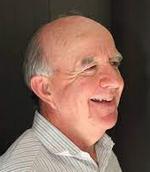EFAC Australia
Welcome to the EFAC Website
- Details
- Written by: EFAC Aust
Welcome to the EFAC Australia Website!
We are hoping this website will be used to connect members around Australia and keep everyone up to date with what's happening in their state. We have branches in each state plus the ACT and NT, so by clicking on your branch under the tab above, you can find out what is happening in your state. The site will be updated with news and events.
If you have any suggestions for the site please forward them to
EFAC Global response to the Church in Wales
- Details
- Written by: Stephen Hale
Statement by 
THE EVANGELICAL FELLOWSHIP IN THE ANGLICAN COMMUNION
in support for Evangelical Fellowship in the Church in Wales (EFCW)
In July this year Archbishop Cherry Vann was installed as Primate of the Anglican Church in Wales. At the time of her appointment there was both local and global shock and disappointment, given that she is in a same sex relationship which is contrary to Lambeth 1.10. The responses of Gafcon and the GSFA reflect these concerns.
Since then the position of faithful and orthodox Anglicans in Wales has become acutely challenging.
A cultural change to evangelism: the election of Ric Thorpe as Archbishop of Melbourne
- Details
- Written by: Peter Adam
 I read in a book on management that minor technical changes are easy to achieve, but cultural changes are hard to achieve! And if cultural changes take a long time to achieve in a church, they take much longer to achieve in a larger and looser structure such as a diocese. But cultural changes in a diocese have a great impact on local churches.
I read in a book on management that minor technical changes are easy to achieve, but cultural changes are hard to achieve! And if cultural changes take a long time to achieve in a church, they take much longer to achieve in a larger and looser structure such as a diocese. But cultural changes in a diocese have a great impact on local churches.
WHAT HAPPENED?
In this election, we saw a massive cultural change to focus on evangelism!
Who did we elect? 70% of the Melbourne Anglicans who were members of Synod voted for Ric Thorpe, an effective personal evangelist, experienced in planting churches with the gospel, and reinvigorating churches with the gospel, the gospel of God’s free gift of grace and love in the Lord Jesus Christ. We voted for an Archbishop to transform the culture of the diocese and our churches from maintenance to mission, and a cultural change to prioritise evangelism!
Read more: A cultural change to evangelism: the election of Ric Thorpe as Archbishop of Melbourne
Partnering Together to Reach a City: The Trinity Network Story
- Details
- Written by: Paul Harrington
 ADELAIDE IS A GREAT PLACE TO LIVE
ADELAIDE IS A GREAT PLACE TO LIVE
When you think about Adelaide, what comes to mind? The City of Churches? The AFL Gather Round? Wineries? Pie floaters (an Adelaide cuisine involving a meat pie floating in pea soup and smothered in tomato sauce)? When I ask some of my friends this question, they say, ‘Not much!’. I’ve lived in Adelaide most of my life and love it.
But here is the thing you really need to know about Adelaide and South Australia – we are gospel poor. A tiny percentage of the population attends church regularly, and few of these are in evangelical churches. Like every other state in Australia over the last 60 years, mainline churches have experienced a huge drop in attendance and membership. Our city and state are full of people who are spiritually lost and in desperate need of the gospel.
Read more: Partnering Together to Reach a City: The Trinity Network Story
City-to-City
- Details
- Written by: Andrew Katay
 ANDREW KATAY INTERVIEWED BY STEPHEN HALE
ANDREW KATAY INTERVIEWED BY STEPHEN HALE
Stephen Hale: City to City commenced in Australia around 2010; and you became the CEO around 2014, is that right?
Andrew Katay: Yes. City to City had made a connection here at the end of 2010, with the first event in 2011. Tim Keller was not inclined to lead a conference here in Australia unless it would lead to some tangible movement in the church, but by 2014 there was this nascent city expression that had already begun to emerge in the couple of years prior.
Stephen Hale: There was the Trinity Network in Adelaide, and City on a Hill had started in 2007.
Andrew Katay: Yes, so Tim had a level of confidence that if he did come out, it could achieve what he hoped: a movement. And that’s when City to City really became a public thing. We realised that with the conference, we needed proper governance, so we created a company limited by guarantee with a proper board and so on. That enabled us to employ some staff and function as a proper organisation from the end of 2013. The “Pastors and Planters” conference, which many remember, happened in 2014, with 800 or so people packed into the Wesley Theatre.
Page 1 of 14
